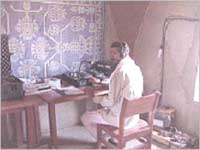|
 WMO ICT success story: WMO ICT success story:
Digitizing weather services for local contexts
Realizing the need to improve the quality and quantity of surface observations relating to weather forecasts and climate predictions in Africa, the World Meteorological Organization (WMO) proposed a pilot project in June 2002 that seeks to utilize the existing network of HAM (amateur radio system) radio operators to improve the reporting of meteorological observations to the national meteorological centers (NMCs) in the region . Sponsored by the United States National Weather Service, the overall objective of the one-year project is to create a cooperative weather observer network to help the countries of Africa better prepare for drastic climate changes and avert natural disasters. So far over 50 potential operators have been identified throughout Africa, and the implementation of the project is currently underway.
Implementation
The proposal for Africa seeks the help of HAM radio operators to become grassroots weather observers. Given the lack of indigenous knowledge about weather observation and climate prediction, the WMO works with its permanent representatives in each country to host training workshops to help HAM radio operators develop the requisite meteorological skills to participate in the growing surface weather observation network. Gauging from a similar WMO-sponsored project in the Caribbean, where more than 55 new weather stations have joined the grassroots-observing
network, the African project promises to significantly enhance countries' ability to predict climate changes. In East Africa, for instance, over 20 stations are in the process of joining the observing network.
Once the HAM radio volunteers have completed training, the project organizers would begin installation of inexpensive, stand-alone weather stations in remote areas. In an effort to strengthen the capabilities of the NMHSs in the region, the NMCs work with the HAM radio operators to strategically position these weather stations throughout the country to ensure the most effective distribution of meteorological information. Similar to the other HAM radio-based projects, the WMO permanent representatives of the African countries would closely monitor the quantity and quality of the data submitted by the HAM radio volunteers, thus ensuring the accuracy of information.
Summary
Similar to its Caribbean counterpart, the pilot project proposed for Africa is designed to help national and regional NMCs predict and prepare for extreme weather events well in advance. The project seeks to significantly improve long-range forecasting, while enhancing the capabilities of indigenous scientists to interpret hydro-meteorological data through training workshops. The fact that over the last four years the number of people trained in using satellite data for weather forecasts has dramatically increased illustrates the demand for training and the success of WMO's initiatives.
To read the whole article on this project and the WMO's global ICT efforts visit the following link: https://www.itu.int/osg/spu/wsis-themes/ict_stories/WMOcasestudy.html
|



